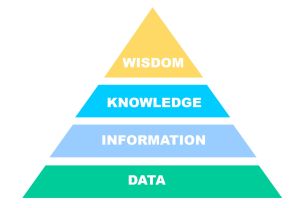Knowledge: Difference between revisions
Jump to navigation
Jump to search
No edit summary |
No edit summary |
||
| Line 5: | Line 5: | ||
=Notes= | =Notes= | ||
* Data, information, knowlegde and wisdom are distinguished in the DIKW-model/pyramid. <ref name="ref2">Wikipedia: DIKW-pyramid. [https://en.wikipedia.org/wiki/DIKW_pyramid] </ref> | * Data, information, knowlegde and wisdom are distinguished in the DIKW-model/pyramid. <ref name="ref2">Wikipedia: DIKW-pyramid. [https://en.wikipedia.org/wiki/DIKW_pyramid] </ref> | ||
* Thinking about the concept of knowledge belongs to the field of epistomology. | |||
<ref name="ref5">Wikipedia: Epistemology [https://en.wikipedia.org/wiki/Epistemology]</ref>. | <ref name="ref5">Wikipedia: Epistemology [https://en.wikipedia.org/wiki/Epistemology]</ref>. | ||
=Generic relations= | =Generic relations= | ||
| Line 13: | Line 12: | ||
* Asset | * Asset | ||
[[Subordinate concept]]s A are: | |||
[[Subordinate concept]]s are: | |||
* [[Descriptive knowledge]] | * [[Descriptive knowledge]] | ||
* [[Procedural knowledge]] | * [[Procedural knowledge]] | ||
* [[Knowledge by acquaintance]] | * [[Knowledge by acquaintance]] | ||
[[File:Tatic-vs-explicit-knowledge-1200x902.png|thumb|Explicit versus tacit knowledge]] | [[File:Tatic-vs-explicit-knowledge-1200x902.png|thumb|Explicit versus tacit knowledge]] | ||
[[Subordinate concept]]s B are: | |||
[[Subordinate concept]]s are: | |||
* [[Tacit knowledge]] | * [[Tacit knowledge]] | ||
* [[Explicit knowledge]] | * [[Explicit knowledge]] | ||
Revision as of 22:13, 16 December 2022
Definition
Knowledge is a human or organizational asset enabling effective decisions and action. [1]
Notes
- Data, information, knowlegde and wisdom are distinguished in the DIKW-model/pyramid. [2]
- Thinking about the concept of knowledge belongs to the field of epistomology.
[3].
Generic relations
Superordinate concept in the generic relation is:
- Asset
Subordinate concepts A are:
Subordinate concepts B are:
Characteristics
Characteristics of knowledge that can be distinguished are:
- Clarity
- Completeness
- Accuracy
- Timeliness
- Accesibility
- Relevance
- Concreteness
- Consistency
- Value
- Structure
- Status
- Version

